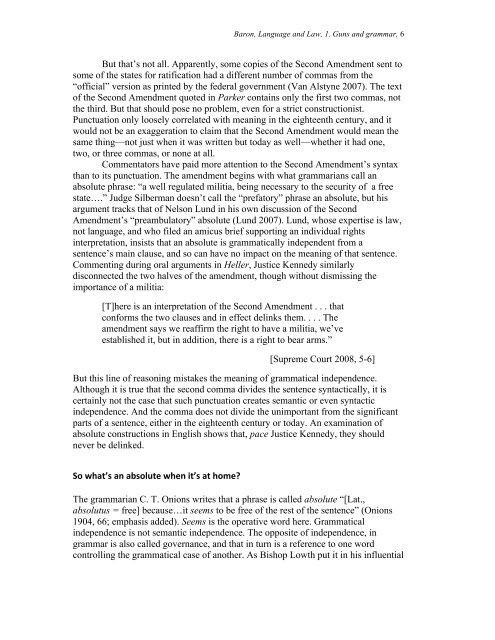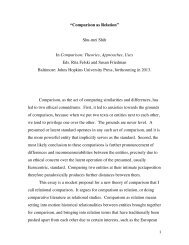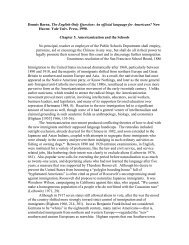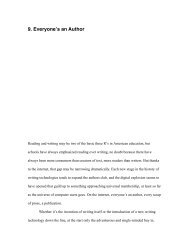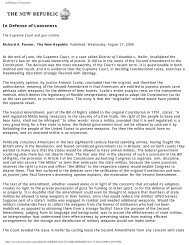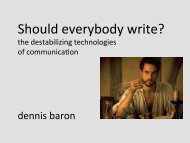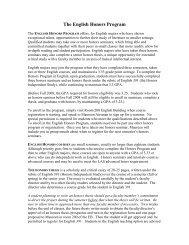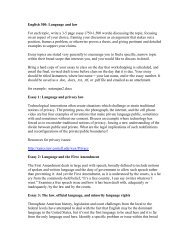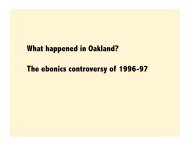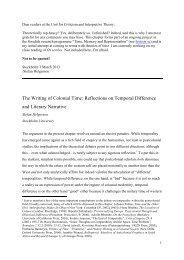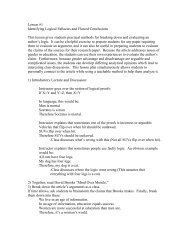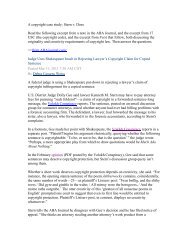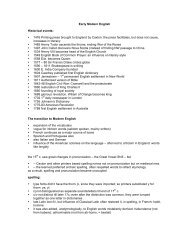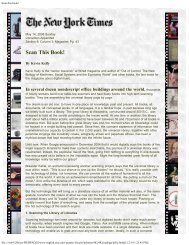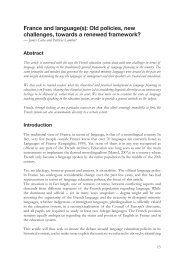1. Guns and Grammar: Determining what the Second ... - English
1. Guns and Grammar: Determining what the Second ... - English
1. Guns and Grammar: Determining what the Second ... - English
Create successful ePaper yourself
Turn your PDF publications into a flip-book with our unique Google optimized e-Paper software.
Baron, Language <strong>and</strong> Law, <strong>1.</strong> <strong>Guns</strong> <strong>and</strong> grammar, 6But that’s not all. Apparently, some copies of <strong>the</strong> <strong>Second</strong> Amendment sent tosome of <strong>the</strong> states for ratification had a different number of commas from <strong>the</strong>“official” version as printed by <strong>the</strong> federal government (Van Alstyne 2007). The textof <strong>the</strong> <strong>Second</strong> Amendment quoted in Parker contains only <strong>the</strong> first two commas, not<strong>the</strong> third. But that should pose no problem, even for a strict constructionist.Punctuation only loosely correlated with meaning in <strong>the</strong> eighteenth century, <strong>and</strong> itwould not be an exaggeration to claim that <strong>the</strong> <strong>Second</strong> Amendment would mean <strong>the</strong>same thing—not just when it was written but today as well—whe<strong>the</strong>r it had one,two, or three commas, or none at all.Commentators have paid more attention to <strong>the</strong> <strong>Second</strong> Amendment’s syntaxthan to its punctuation. The amendment begins with <strong>what</strong> grammarians call anabsolute phrase: “a well regulated militia, being necessary to <strong>the</strong> security of a freestate….” Judge Silberman doesn’t call <strong>the</strong> “prefatory” phrase an absolute, but hisargument tracks that of Nelson Lund in his own discussion of <strong>the</strong> <strong>Second</strong>Amendment’s “preambulatory” absolute (Lund 2007). Lund, whose expertise is law,not language, <strong>and</strong> who filed an amicus brief supporting an individual rightsinterpretation, insists that an absolute is grammatically independent from asentence’s main clause, <strong>and</strong> so can have no impact on <strong>the</strong> meaning of that sentence.Commenting during oral arguments in Heller, Justice Kennedy similarlydisconnected <strong>the</strong> two halves of <strong>the</strong> amendment, though without dismissing <strong>the</strong>importance of a militia:[T]here is an interpretation of <strong>the</strong> <strong>Second</strong> Amendment . . . thatconforms <strong>the</strong> two clauses <strong>and</strong> in effect delinks <strong>the</strong>m. . . . Theamendment says we reaffirm <strong>the</strong> right to have a militia, we’veestablished it, but in addition, <strong>the</strong>re is a right to bear arms.”[Supreme Court 2008, 5-6]But this line of reasoning mistakes <strong>the</strong> meaning of grammatical independence.Although it is true that <strong>the</strong> second comma divides <strong>the</strong> sentence syntactically, it iscertainly not <strong>the</strong> case that such punctuation creates semantic or even syntacticindependence. And <strong>the</strong> comma does not divide <strong>the</strong> unimportant from <strong>the</strong> significantparts of a sentence, ei<strong>the</strong>r in <strong>the</strong> eighteenth century or today. An examination ofabsolute constructions in <strong>English</strong> shows that, pace Justice Kennedy, <strong>the</strong>y shouldnever be delinked.So <strong>what</strong>’s an absolute when it’s at home? The grammarian C. T. Onions writes that a phrase is called absolute “[Lat.,absolutus = free] because…it seems to be free of <strong>the</strong> rest of <strong>the</strong> sentence” (Onions1904, 66; emphasis added). Seems is <strong>the</strong> operative word here. Grammaticalindependence is not semantic independence. The opposite of independence, ingrammar is also called governance, <strong>and</strong> that in turn is a reference to one wordcontrolling <strong>the</strong> grammatical case of ano<strong>the</strong>r. As Bishop Lowth put it in his influential


